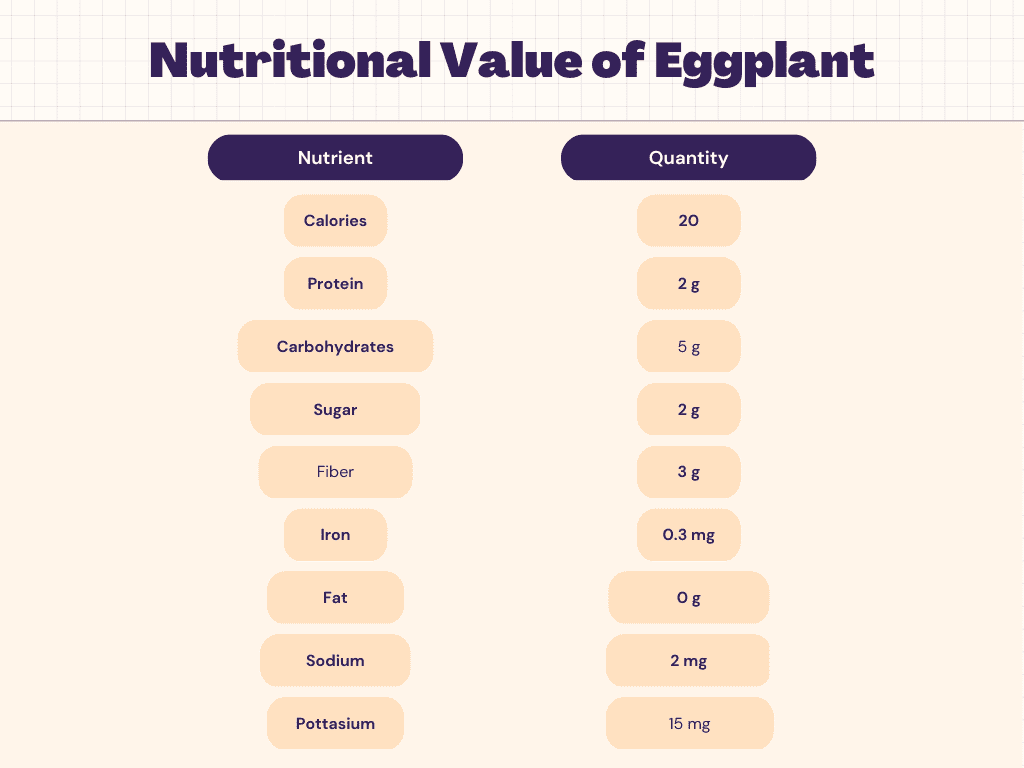The aubergine, often known as an eggplant, offers fiber and a variety of nutrients. This vegetable with few calories is part of the Mediterranean diet. However, the shape, size, and color can vary from small and oblong to long and thin, from hues of purple to white or green. Most of us are familiar with enormous, dark purple eggplants.
Nutritional Value of Eggplant
Nutritional Facts of Eggplant
Carbs
There are 4.8 grammes of carbohydrates in one cup of raw eggplant, with fiber accounting for nearly half of them (2.4 grams). Additionally, eggplant has about 3 grams of naturally occurring sugars. Low-glycemic foods include eggplant.
Fat
Nearly all of the fat in eggplant is water.
Protein
One serving of eggplant contains less than 1 gram of protein.
Health Benefits Of Eggplant
- For thousands of years, traditional medicine has used eggplant as a component. Practitioners of the ayurvedic medical system in ancient India utilized white eggplant to treat diabetes and the roots to treat asthma.
- Even while the eggplant isn’t the healthiest vegetable, it does provide you with a respectable amount of potassium and fiber. As long as you don’t drench it in oil, it’s a relatively guilt-free snack with only 25 calories and less than 1 gram of fat per serving. Helps in weight loss management. Follow our Weight Loss Plans.
- Antioxidants included in eggplant, such as vitamins A and C, aid in preventing cell deterioration. Additionally, it has a lot of polyphenols, which are organic plant molecules. If you have diabetes, these chemicals may improve how well your cells process sugar. Follow our Diabetes Plans.
Vitamins & Minerals in Eggplant
vitamins in one serving:
- Folate – 22 micrograms
- Vitamin A – 23 IUs
- Vitamin C – 2.2 milligrams
- Vitamin K – 3.5 micrograms
minerals in one serving:
- Calcium – 9 milligrams
- Iron – 0.23 milligrams
- Magnesium – 14 milligrams
- Phosphorus – 24 milligrams
- Potassium – 229 milligrams
The Bottom Line
A naturally fat-free, low-calorie source of complex carbs with lots of fiber is eggplant. In addition, it provides vitamin K, potassium, and manganese in modest levels. The Solanaceae family, usually referred to as the nightshade family, includes eggplants. Tomatoes, peppers, and potatoes are additional typical nightshades. Despite the fact that these vegetables are packed with nutrients, some individuals avoid them because they may promote inflammation, especially in persons who already have certain inflammatory diseases like psoriasis or arthritis. A naturally fat-free, low-calorie source of complex carbs with lots of fiber is eggplant. In addition, it provides vitamin K, potassium, and manganese in modest levels.
FAQs
How many eggplants can I eat in a day?
You should consume 5 servings of veggies every day, according to recommendations. A serving of vegetables is considered to be one-fourth of an eggplant (75g).
Should I eat an Eggplant before or after exercise?
You can eat eggplant before working out, yes. Carbohydrates are the main component of eggplants, which give you energy for exercise.
What is the best time to eat Eggplant?
Tyramine, an amino acid found in high concentrations in eggplants, raises norepinephrine levels, a stimulant that can prevent sleep. Hence they are more effective if eaten in the day.
What are the benefits of Eggplant?
- Helps in increasing bone density
- Helps in reducing cell damage
- Helps with digestion
- Helps in the improvement of heart health
- Helps to prevent Anemia
- Helps with weight maintenance










